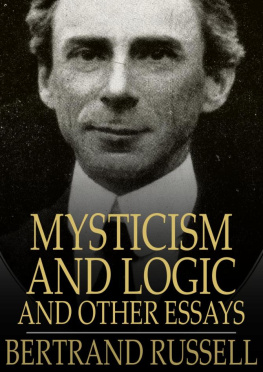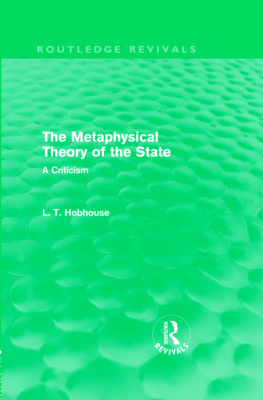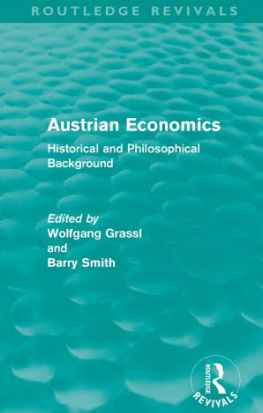First published 1896
by Methuen & Co.
This edition first published in 2013 by Routledge
2 Park Square, Milton Park, Abingdon, Oxon, OX14 4RN
Simultaneously published in the USA and Canada
by Routledge
711 Third Avenue, New York, NY 10017
Routledge is an imprint of the Taylor & Francis Group, an informa business
1896 L. T. Hobhouse
All rights reserved. No part of this book may be reprinted or reproduced or utilised in any form or by any electronic, mechanical, or other means, now known or hereafter invented, including photocopying and recording, or in any information storage or retrieval system, without permission in writing from the publishers.
Publisher's Note
The publisher has gone to great lengths to ensure the quality of this reprint but points out that some imperfections in the original copies may be apparent.
Disclaimer
The publisher has made every effort to trace copyright holders and welcomes correspondence from those they have been unable to contact.
A Library of Congress record exists under LC control no: 02005868
ISBN: 978-0-415-81160-6 (hbk)
ISBN: 978-0-203-58883-3 (ebk)
THE
THEORY OF KNOWLEDGE
A CONTRIBUTION TO SOME PROBLEMS OF LOGIC AND METAPHYSICS
BY
L. T. HOBHOUSE
FELLOW AND ASSISTANT-TUTOR OF CORPUS CHRISTI COLLEGE
OXFORD
METHUEN & CO.
36 ESSEX STREET, W.C.
LONDON
1896
PREFACE
THE world of thought at the present day is in a somewhat anomalous condition. We have come to the point where science seems to stand in real danger of being ruined by her own success. The mass of accumulated fact on which she justly prides herself has become too vast for any single mind to master. There could be no Aristotle in the nineteenth century. Year by year it becomes more difficult to take any sort of view of the whole field of knowledge which should be at once comprehensive and accurate. It results that positive knowledge can scarcely be said any longer to have a general purpose or tendency. Intellectually, it is an age of detail.
The unity which we miss in science we might hope to find in philosophy. And here, indeed, our century has done its best. In Germany, in France, and in England it has produced great systems, containing elements of high permanent value. But these systems date from before the deluge of specialism. And they have all been, not so much refuted,for a dialectical refutation can, after all, be lived down,as undermined by the subsequent movement of thought and discovery. Nor is this all. Not only is there no accepted scientific system, but in England, at least, the tendency of philosophic work is scarcely sympathetic to science. So far from seeing our way to a near or distant synthesis, we are more distracted than ever when we turn from science to philosophy. Instead of uniting the sciences, philosophy threatens to become a separate and even a hostile doctrine. The antagonism is doubtless veiled, and the philosopher, like the theologian, is careful to avoid direct conflict with a far stronger foe. But the veil is not difficult to pierce.
The reaction against the scientific spirit, so characteristic of our generation, has shown itself in the philosophic world in the decay of what has been called the English school. Along with many defects and limitations, that school, from Bacon and Locke to Mill and Spencer, has had the merit of dealing, or attempting to deal, in a sympathetic spirit with the problems and methods of the sciences. The shortcomings of empiricism have been pointed out adequately enough now by the brilliant series of critics who have drawn their inspiration from other sources, and the danger at present seems to be that the real services of the English school should be forgotten. On the other hand, the newer movement in our thought, now itself nearly thirty years old, has hardly fulfilled its promise of giving us on metaphysical grounds a better synthesis than could be hoped for from science. As time has gone on, the purely negative and critical side of the movement has tended to gain the upper hand; and in the great metaphysical work of the keenest intellect which the school has produced, while everyone admits the force of the negative dialectics, such constructive conceptions as remain seem scarcely at home.
The net result is that in philosophy we tend towards negation. We get far enough to be sceptical about the foundations of science, and there we stop. In such a state of things the sinister interests in the commonwealth of knowledge see their chance. The popular essayist tells us that there is really nothing to speak of that we can know with certainty. One belief is on the whole as untrue as another, and therefore why not keep to that which is recommended to us by authority as best suited to our needs? An elegant scepticism about science takes the place of the elegant scepticism of theology with which our forefathers were familiar.
If we dismiss scepticism as a mere symptom of temporary intellectual paralysis, the task before philosophy, if full of difficulty, seems equally full of hope. In many directions ideas have been struck out, principles suggested, old barriers to clear thinking removed, and detail work accomplished in a thoroughgoing manner. The main difficulty is to blend the divergent currents of thought, and in particular the methods of philosophy and science. For such a synthesis the first step needed is to break down the wall still maintained between the sphere of the systematised common sense which we call science and the world of ultimate reality. The contrast between the natural and supernatural, the shadow of which still lingers in the metaphysical contrast of phenomena and nomena, or appearance and reality, needs to be banished before we can even think of knowledge as a harmonious whole. But if science may claim to investigate the really real, we need not suppose that its analytic method is the only process which can do so. The higher conceptions by which idealism has so firmly held are not to be scientifically treated in the sense of being explained away. What is genuinely highest, we have good reason to think, must also be truest, and we cannot permanently acquiesce in a way of thinking which would resolve it into what is lowest. The time would thus seem ripe for an unprejudiced attempt to fuse what is true and valuable in the older English tradition with the newer doctrines which have now become naturalised among us. In betaking ourselves to Lotze and Hegel, we need not forget what we have learnt from Mill and Spencer; and if we can hold the old and new together we may perhaps find ourselves on the way to the synthesis which we seek.







